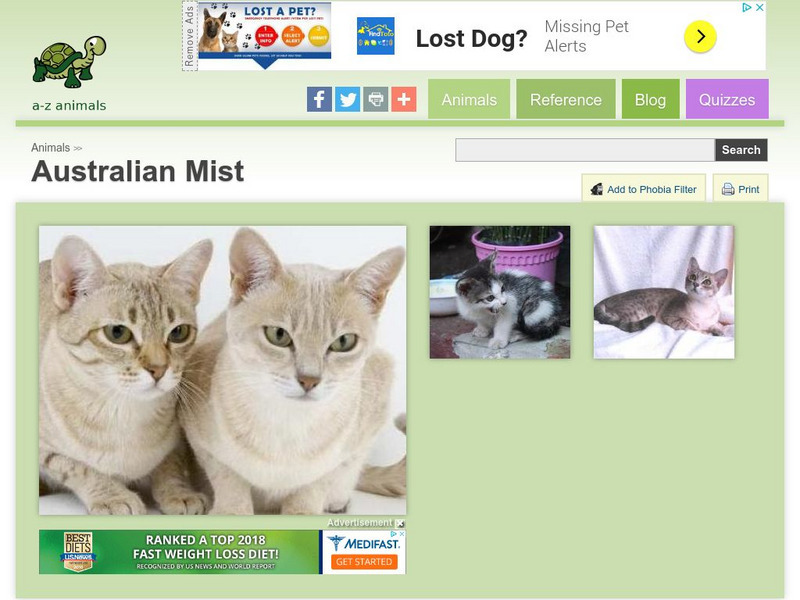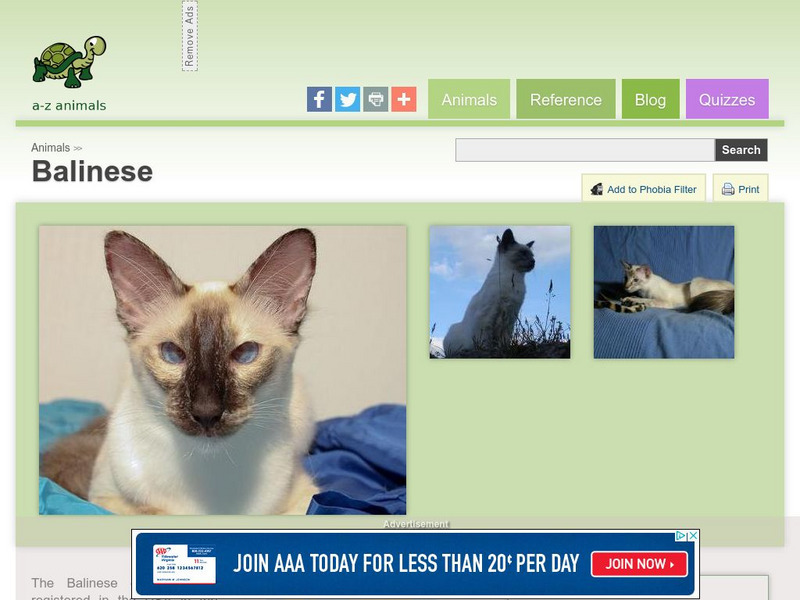A-Z Animals
A Z Animals: Animal Facts: Australian Mist
Provides images and a summary of the Australian Mist cat breed. This resource also offers statistics and details on the breed's temperament and value as a pet.
A-Z Animals
A Z Animals: Animal Facts: Maine Coon
View images and read statistics and facts about the Maine Coon cat breed, including where this breed lives, its appearance, and about its popularity as a pet.
Friends of Algonquin Park
The Science Behind Algonquin's Animals: Black Bear
Known as the American Black Bear or commonly the Black Bear, information is detailed on its appearance, weight, migration patterns, food sources, major predators and breeding. This is an excellent resource for the student researcher.
Friends of Algonquin Park
The Science Behind Algonquin's Animals: Brook Trout
Learn about the Brook Trout's appearance, size, migration, food sources and breeding as well as the answers to other interesting research questions. Included is a video showing the capturing and marking of a Brook Trout and an...
Curated OER
National Park Service: Now We Are at War
A good look at the impact of geography in regard to the Battle of Bunker/Breed's Hill. Site offers a great lesson plan put together by a Park Ranger from the battleground park.
Cold Spring Harbor Laboratory
Dolan Dna Learning Center: Nobel Laureate Barbara Mc Clintock
The interactive activity examines the discoveries of Barbara McClintock on the correlation between chromosome behavior and breeding experiments in corn.
Canadian Wildlife Federation
Hinterland Who's Who: Polar Bear
Canadian Wildlife site features the Polar Bear. Highlights its habitats and habits, range, feeding and breeding characteristics.
Canadian Wildlife Federation
Hinterland Who's Who: Loons
Canadian Wildlife site features the Loon. Highlights its habitat and habits, range, feeding and breeding characteristics.
Canadian Wildlife Federation
Hinterland Who's Who: Canada Goose
Canadian Wildlife site features the Canada Goose. Highlights its habitat and habits, range, feeding and breeding.
Canadian Wildlife Federation
Hinterland Who's Who: Ruby Throated Hummingbird
Canadian Wildlife site offers important information about the Ruby-Throated Hummingbird such as its' habitat, feeding and breeding.
Sea World Parks & Entertainment
Sea World: Clydesdales
Outlines the characteristics of horses and the Clydesdale breed, including classification, history, behaviors, and diet. Information at a level of upper intermediate elementary but easily adaptable for all teachers.
National Health Museum
Access Excellence: Wolf Pack in a Bottle: Dna Simulation
This lesson plan can be used to illustrate the principle of electrophoresis without the equipment. Paper chromatography can be used to separate dye just like electrophoresis will separate DNA. The lab also covers DNA analysis for an...
Smithsonian Institution
Smithsonian National Zoo: Zoogoer Magazine: Mexican Wolves, Wild Once Again
Cheryl A. Sweet's article on the conservation of Mexican wolves centers on the near extinction and ongoing survival of the wolves. The article goes through a variety of sections including The Lost Lobo, An Uncertain Beginning,...
Smithsonian Institution
Smithsonian National Zoo: Zoogoer Magazine: Conceiving a Future for Cheetahs
Phyllis McIntosh's article in Zoogoer Magazine presents information on the conservation of Cheetahs. She discusses the difficulties of breeding amongst Cheetahs, as well as the predicted future of Cheetah cubs.
A-Z Animals
A Z Animals: Animal Facts: Balinese
Provides images and a summary of the Balinese cat while offering statistics and details on the breed's temperament and value as a pet.
A-Z Animals
A Z Animals: Animal Facts: Somali
This entry identifies the defining characteristics of the somali, a breed of Abyssinian cat.
A-Z Animals
A Z Animals: Reference: Conservation
This entry identifies the defining characteristics of animal conservation, including endangered species, animal protection, habitat protective, captive breeding, animal appeal and CITES (Convention on International Trade in Endangered...
Smithsonian Institution
Smithsonian Tween Tribune: How to Make a Tastier Tomato
How do you make tomatoes taste even better? Read about a scientist whose goal is to make tomatoes taste as sweet as candy by using natural breeding techniques.
PBS
Pbs Teachers: Scientific American: Dragon Science: Food for Thought
Investigate how geneticists use selective breeding to capitalize on hybrid vigor by using colored chips to represent traits in succeeding generations. Use Explain why farmers must buy new hybrid seed each year.
Other
United Peafowl Association: Peafowl
Did you know the male peafowl is called the peacock and the female is called the peahen? What is the difference between a peafowl and a pheasant? Find out the answers to these questions along with information on scientific...
Independence Hall Association
U.s. History: Bunker Hill
Read about the Battle of Bunker Hill, which really took place at Breed's Hill, and find out why it was such a stunning victory for the Americans even though they lost the battle.
University of Missouri
University of Missouri: Selecting Your Riding Horse
Many factors go in to the purchasing of a riding horse. This complete site discusses horse breeds, physical shape and balance, age and size, pedigree, and price.
Other
Dog Breed Info Center: Toy Poodle
Affectionately called the French Poodle, here is a darling picture of two little ones plus a good description of temperament, height, weight, origin and more.
Other
New Breed Software: Tux Paint
This resource provides a free drawing program designed for elementary students.
Other popular searches
- Breeds of Dogs
- Dog Breeds
- Cattle Breeds
- Beef Cattle Breeds
- Horse Breeds
- Cat Breeds
- Breeds of Horses
- Beef Breeds
- Goat Breeds
- Livestock Breeds
- Cat Breeds Punnett Square
- Dairy Cattle Breeds


















